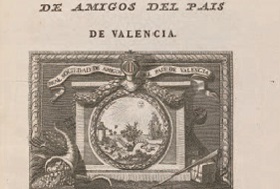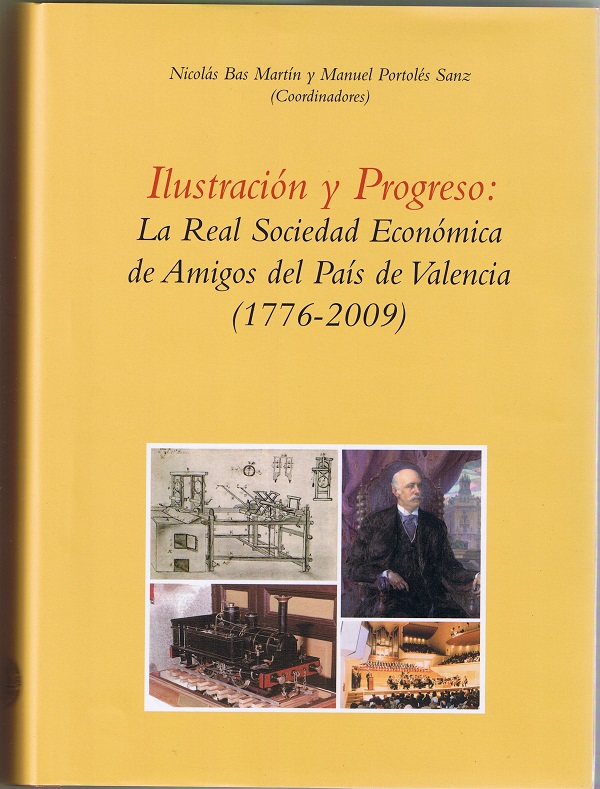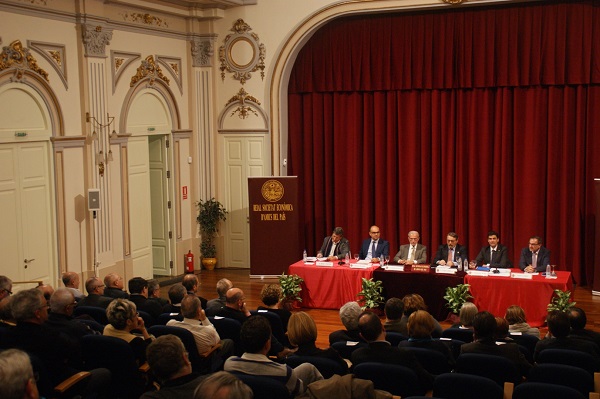
Born in the Enlightenment, in the so-called Century of Light, the Economic Society of Friends of the Country of Valencia (RSEAPV), in almost 250 years of history, has played a leading role in the economic, technological, cultural and social life of the city of Valencia and, even, of the Valencian Community.
The RSEAPV was founded in 1776 thanks to the altruistic initiative of seven Valencian patricians: Pedro Mayoral, Francisco Pérez Mesía, Sebastián de Saavedra, Francisco de Lago, Juan de Vao, the Marquis of León and the Marquis of Mascarell. Its creation was framed within the context of the reforms in all branches of productive and commercial activities, including education in its various degrees, undertaken by the government of Charles III of Spain who, together with other personalities and groups, sought to promote economic growth to match Spain with the most advanced European societies.
The initial promoters of the Valencian institution were the nobility and the clergy; however, mercantile groups soon joined the initiative. The work plan was commissioned to the activity of six committees responsible for gathering information and dealing with the most relevant subjects in the country: economy, agriculture, wool factories, linen, hemp, cotton, etc.; silk factories; extraordinary industries and manufactures and labour union legislation.
In addition, the Economic Society established an ambitious program of cash prizes to promote and reward the new intellectual creations and technical and aesthetic inventions, thus contributing to establish the bases of intellectual and modern industrial property in Spain. This way, the entity played a key role in the advancement of the arts, techniques and trades, replacing the defects and limitations of the administration of the time.

Culturally speaking, the company maintained a close collaboration with the world of Valencian printing, especially with the most famous printers, the case of Benito Monfort, and the Orga dynasty, among others. It also helped promote the local economy, supporting the paper industry, among other manufactures. Its area of influence, although according to the Statutes it was based on his work in the city of Valencia, he went beyond the national and international scope, in the United States, where he maintained intense correspondence with the Philosophical Society of Philadelphia.
As a result of all this activity, the important library and archive was developed, which is currently one of the main private bibliographic archives of the Valencian Community, with more than 10,000 document archives, fully digitised, and 4,000 books, in its majority from the eighteenth century.
On the other hand, in the nineteenth century, the Economic Society continued and increased its activities despite the continuous political convulsions that shook the country. As it happened in the eighteenth century, it hosted the most prominent and active characters of the Valencian society, among them the Marquis de Campo, Juan Navarro Reverter, Cirilo Amorós, the Marquis de Cruïlles, José Pizcueta, Juan Bautista Perales, Teodor Llorente, Mariano Cabrerizo, Vicente Boix, Justo Pastor Fuster, the Count of Ripalda, and a multitude of illustrious characters that turned Society into an engine of the Valencian economy and culture of the time.
The organisation was a pioneer in the creation of the first trade schools for women, in the establishment of the first libraries and archives of the city, and in 1869 it inaugurated the first popular library. In this sense, he unveiled a strong support for the most significant writers and works of the Valencian nineteenth century. Amongst them it stands out the financing of the Valencian entity in the work of the librarian and partner of the entity, Justo Pastor Fuster, Valencian Library (1827). As for publishing, it also was in the mid-nineteenth century, specifically in 1841, when the first volume of the Encyclopaedic Bulletin of the RSEAP was published, a key magazine for the recovery process, which until its disappearance in 1875 was called Boletín de la Real Sociedad Económica de Amigos del País (‘Bulletin of the Royal Economic Society of Friends of the Country’).
The Economic Society also developed an intense work in other fields like politics. Therefore, it advised councils and city councils on subjects related to the different branches of the production. However, it was in the field of industry and economy where the achievements of the entity were larger and more transcendental. Thus, in 1818 the first agriculture chair was created which in 1846 joined the University of Valencia. Equally, the Economic Society actively participated in the creation and conditioning of the university botanical garden. He also applied for a chair of Chemistry and, although not implemented, in the teaching of Chemistry of the university lessons of Chemistry Applied to the arts, industries and mines were included on his initiative. In this same line, the entity actively collaborated in the extension to Valencia (as in other cities) of the activities of the Conservatory of Arts and Crafts of Madrid.

But perhaps one of its greatest achievements is linked to the building of the first Valencian railroad, a company promoted by the Marquis de Campo, promoter of other very diverse companies such as gas lighting, drinking water networks in Valencia and the financial impulse of the Valencian Society of Public Works. In 1878 the Society created the Caja de Ahorros y Monte de Piedad of Valencia (future Bancaja and now, after its merger with other savings banks, converted into Bankia). In addition, from its beginnings, the Economic Society took care of the musical culture; it even promoted the creation of the Conservatory of Music of Valencia (1879). It also promoted the creation of the Valencian Archaeological Society (1871), the Shorthand Institute (1881), and the Board of Young Workers (1884).
Public exhibitions as a means of business offering, promotion and dissemination of technological innovations and their internationalisation played a very important role throughout Europe over the course of the nineteenth century. The Economic Society enthusiastically joined these initiatives, organised several exhibitions in Valencia and offered awards for Valencian industrialists to participate in those that were carried out in other cities. Thus, exhibitions of motors and machinery (1880) and regional exhibitions (1867, 1883) of artistic, industrial and agricultural products, a precedent of the famous Valencian Regional Exhibition of 1909 were organised, precursors of the International Trade Fair established in 1917.
In short, the Economic Society credits a history full of accomplishments carried out during the eighteenth, nineteenth and the first third of the twentieth century. Unfortunately, between 1939 and 1975 the entity was plunged into a lethargy driven by the harsh dictatorship of General Franco, who did not respect the deeply democratic spirit of the entity nor its determined commitment to concord, tolerance and respect. However, it is worth highlighting the conservation work of the Library during these years, by the different government boards, but especially by Joaquín Maldonado Almenar, who has kept it for more than twenty years on an apartment of his property and shelter from possible thefts, dispersion and a misuse of it.
From November 1975, and especially after the Constitution or the Magna Carta of 1978, the members of the Economic Society began a period of recovery and revitalisation of the Constitution. In this sense, we must remember Ernest Lluch, who encouraged a group of university students and teachers, together with other citizens and under the direction of Joaquín Maldonado, to start this recovery process.
On December 1985, a new board of governors and a new director of the Economic Society, Francisco Oltra Climent, were elected. They designed a strategy of action that covered three major stages: the first one of continuous revitalisation and recovery, already started; the second one, to publicise and consolidate the entity; and the third one, the current stage: “recognising the work carried out by the Royal Economic Society of Friends of the Country over more than two centuries of existence”.
From 1985 to 1997, and from the designed strategy, an intense and diverse activity was developed, visible in its Annals and publications of those years, that established the bases of what is the current Economic Society, an entity that stands out to be proud of its past, but without wanting to remain anchored to it, a non-profit, democratic, independent (nonpartisan) society, with three key values: respect for people, the Freedom of thought and permanent work for the dissemination of knowledge. And all this with a few financial resources, which have been replaced by the effort of the human capital that the entity, its own, that altruistically have devoted their time to making the corporation one of the sociocultural entities of more prestige in Valencia.
As of 1997, the Valencian Economic Society of Friends of the Country has developed an intense activity through tributes to distinguished Valencians, conferences, exhibitions, book launches, concerts, incorporation of young associates, publications, etc. Areas in which the most diverse fields of knowledge were treated: science and research, business, media, social, cultural, etc. All this in the charge of important university professors, researchers, entrepreneurs, journalists, politicians, and professionals, both nationally and internationally.
Nicolás Bas Martín (University of Valencia)
Personatges i espais de ciència (‘Science characters and spaces’) is a project of the Unit of Scientific Culture and Innovation of the University of Valencia, with the collaboration of the “López Piñero” Institute of History of Medicine and Science and with the support of the Spanish Foundation for Science and Technology and of the Ministry of Economy, Industry and Competitiveness.

.jpg)














